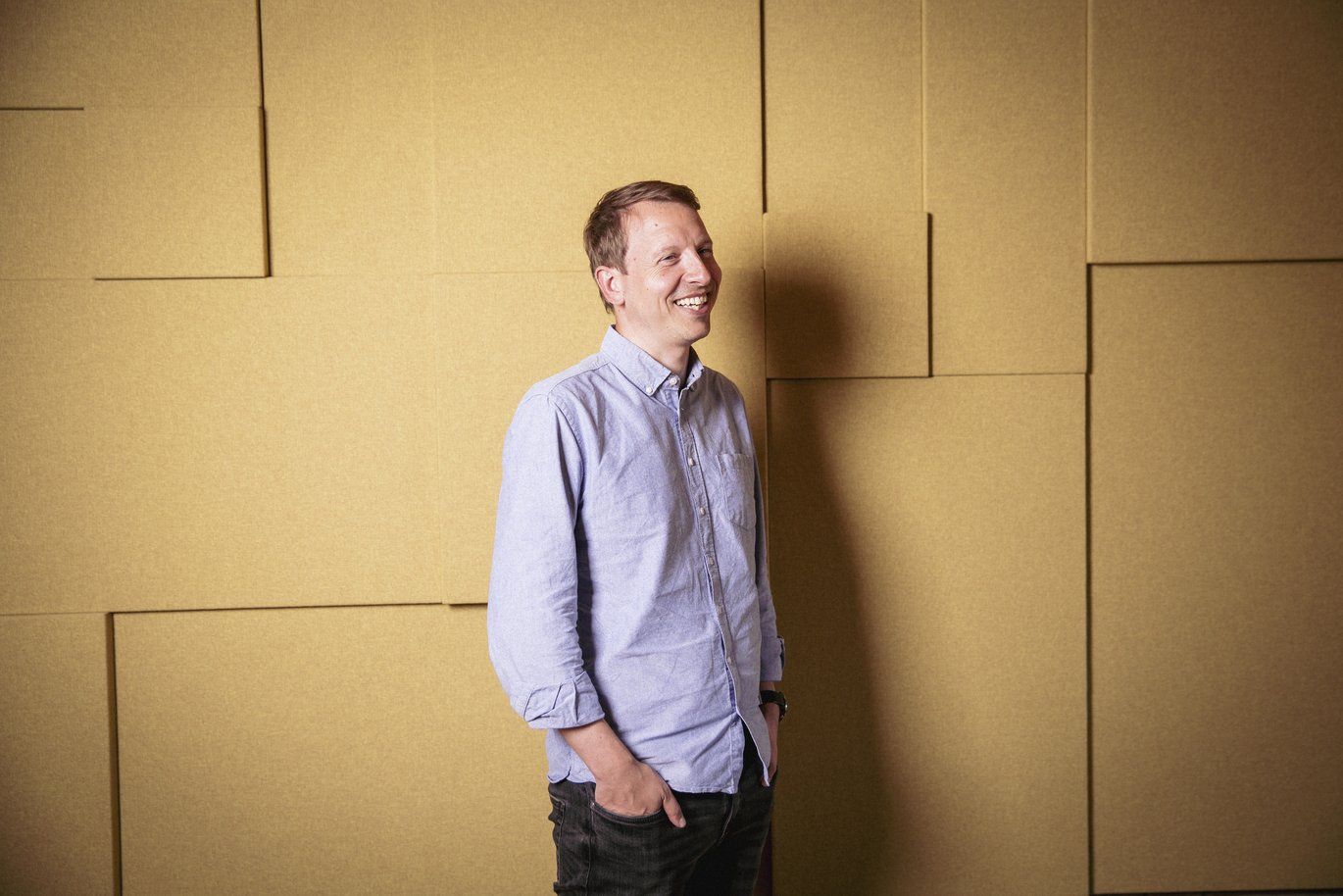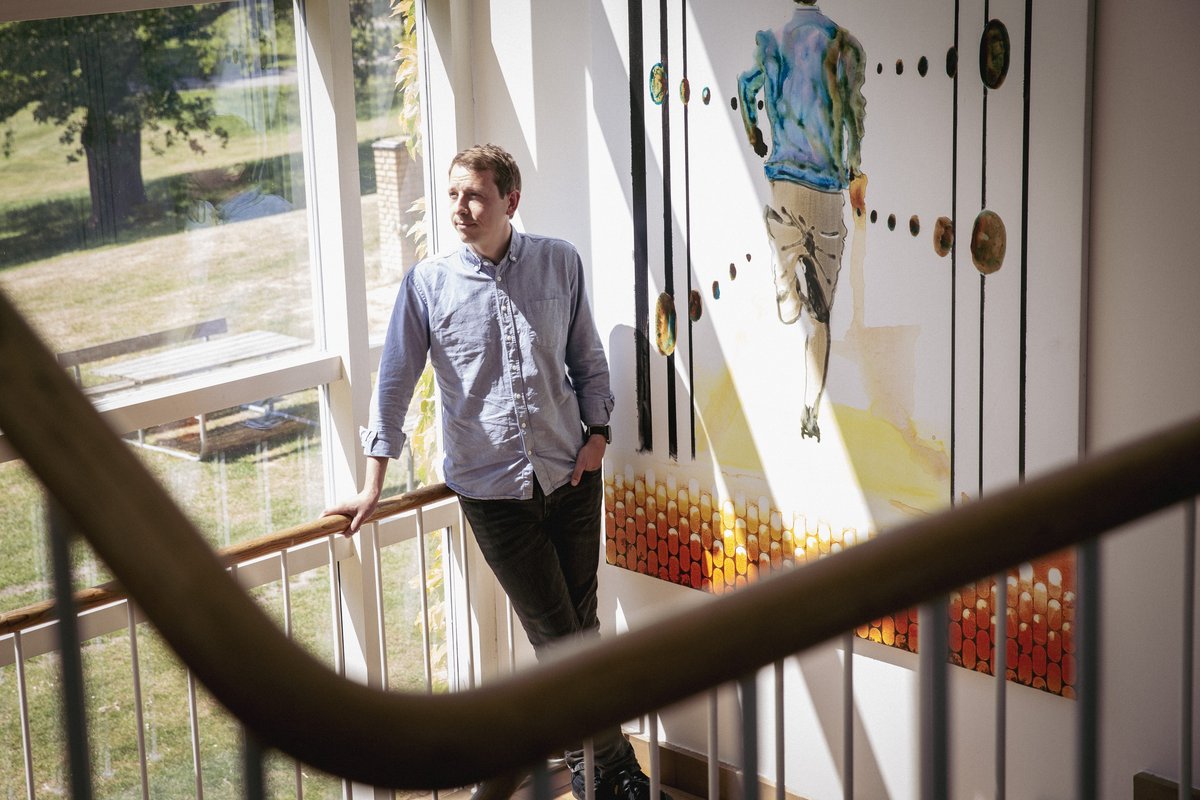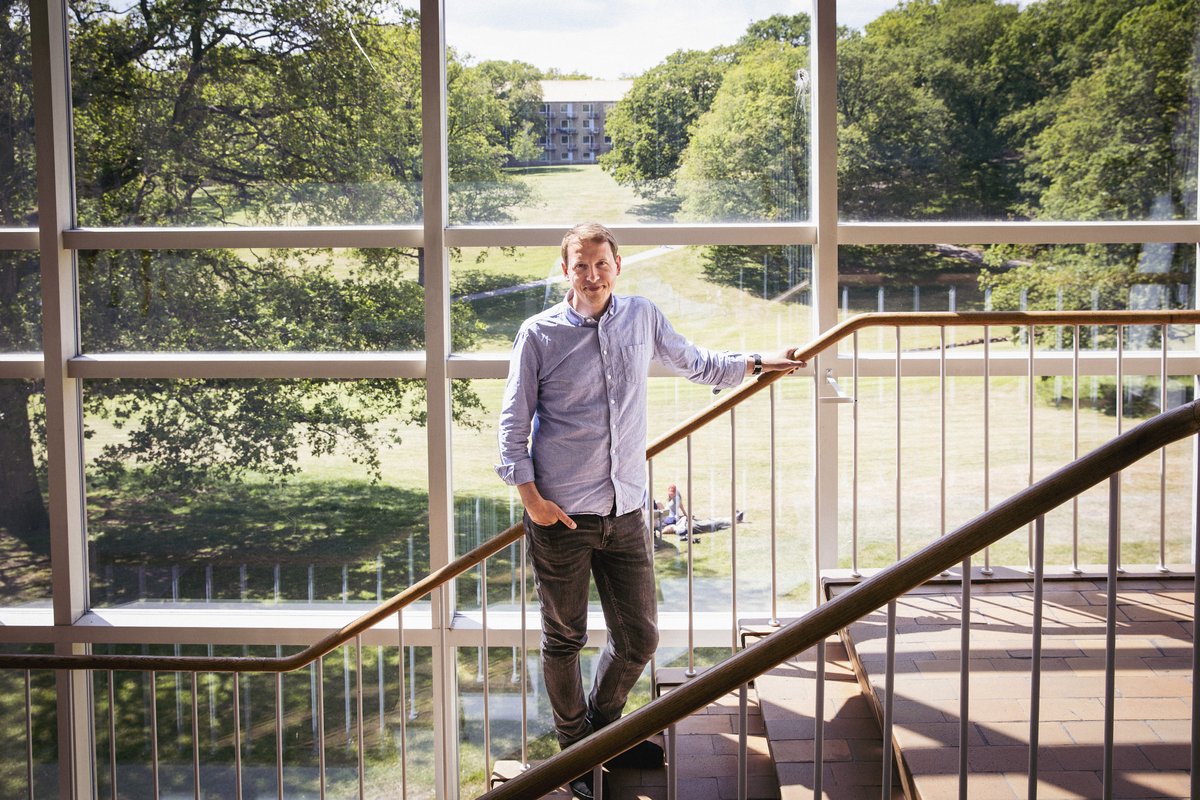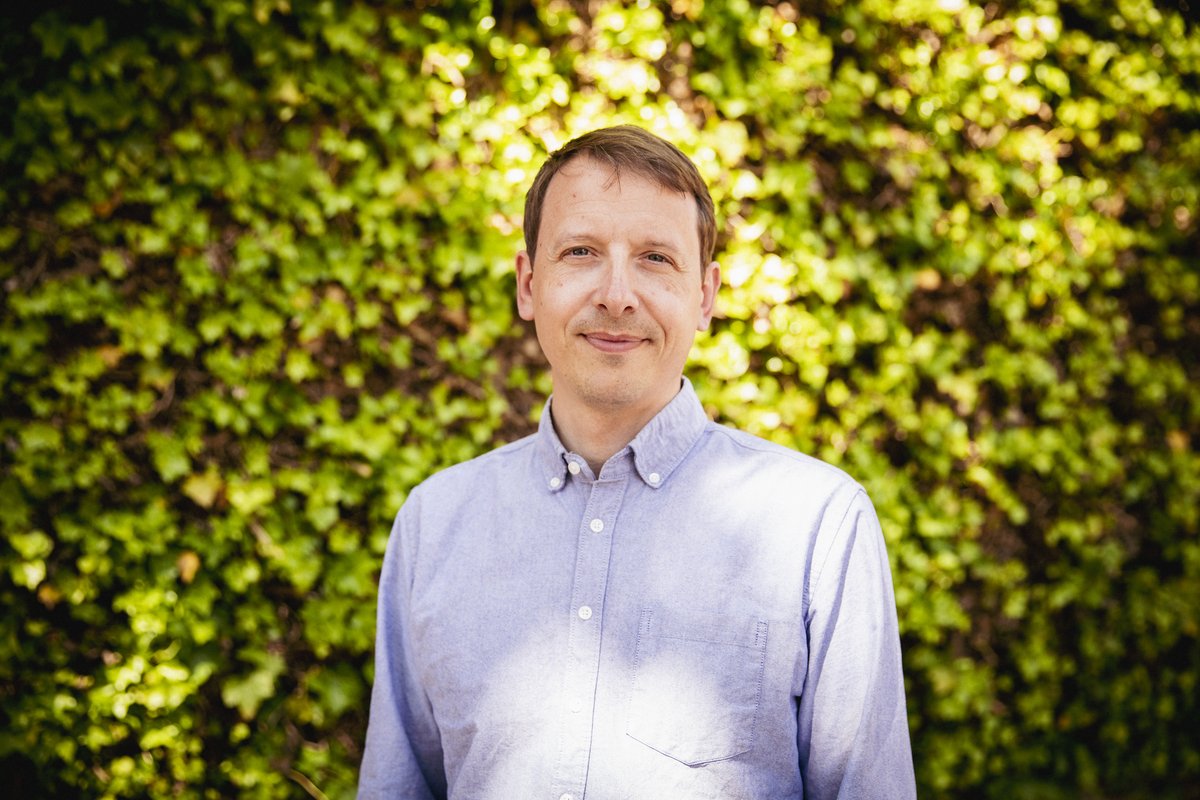AU professor to head new Danish democracy and power study: "The joints of our democracy are starting to creak a bit"
Professor Michael Bang Pedersen from Aarhus University has been selected to head a major research project on power and democracy in Denmark. He predicts that the results of this study may well be more unsettling reading than the first one of its kind, which was published 20 years ago. This is partly due to what he calls the acceleration of society. In five years, the project will result in a diagnosis of society that pinpoints the challenges facing democracy.

Michael Bang Petersen is a busy man these days. The professor at the Department of Political Science has just been tapped to head the upcoming Danish democracy and power study – the second of its kind in Danish history. So his diary has been crammed with interviews and meetings all week.
Petersen, whose research interests include the influence of human evolutionary history on modern political behaviour, became a household name during the Covid pandemic, when his HOPE research project studied how the situation affected people’s behaviour and attitudes. The project earned him the Ministry of Higher Education and Science Research Communication Award and the Cross of Honour of the Order of Dannebrog last year.
Now he has been given five years and 41 million kroner to conduct the Danish democracy and power study, an investigation of how and whether the Danish Folketing and other power structures in society live up to the ideals of democracy.
In 1997, Denmark - inspired by the example of Norway and Sweden - commissioned its first Danish democracy and power study. That project was also coordinated by the Department of Political Science at AU. The six-year project was headed by Lise Togeby (now deceased), a professor of political sociology at AU. She submitted the final report in 2023, and the year after, she supervised then 24-year-old Michael Bang Petersen’s PhD project at Aarhus University. And now 19 years later, it’s Petersen’s turn to head the project.
But a lot has changed since the last Danish democracy and power study. When Togeby started work on the project in the 90s the public mood was optimistic and lighthearted: the Cold War was over, and Europe was in the midst of an economic upswing. Digitalisation was still in its infancy, and no one had ever heard of Facebook, Twitter or YouTube.
In fact, the report on power and democracy in Denmark was generally quite positive, Petersen said:
“The central conclusion in the first report on power and democracy in Denmark was, if one can permit oneself to boil five years of work down to a few sentences, is that Danish democracy is fundamentally robust. There are some challenges, but those challenges are to a high degree the result of political decisions, for example ceding more power to international institutions such as the EU. The summary that came out of the first Danish and democracy and power study was positive and optimistic. And of course it came out of a period characterized by optimism.”

What is the Danish democracy and power study?
The objective of the Danish democracy and power study is to generate research-based knowledge about the state of democracy and the conditions influencing democratic processes.
In 2022, Parliament unanimously voted to update the Danish democracy and power study from 2003, which was the first of its kinds in Denmark and was conducted in the period 1997-2003.
This time, an external advisory group comprised of stakeholder representatives, for example from the Folketing, business and industry associations and trade unions, will be involved in the project. The project’s principal investigators will inform the advisory group of progress and preliminary results during the course of the project.
Michael Bang Pedersen is the head of the research project and will share research leadership responsibility with a team of four or five researchers.
Download an English summary of the 2003 report here: en.unipress.dk/udgivelser/p/power-and-democracy-in-denmark/
The new study will come to rather different conclusions, Petersen expects. He sees cracks in Danish society; people are less optimistic. They no longer trust politicians to the same degree, and more people question the legitimacy of Danish democratic institutions. Social media have changed the rules of the game, and the pace of both media and political processes in the Folketing has accelerated. Although mistrust in the political system is most pronounced in other countries, for example the United States and France, Petersen sees the same challenges on a smaller scale here in Denmark.
“There are a number of signs that the joints of our democracy are creaking a bit,” he said.
We’ll return to the question of precisely what factors Petersen sees as contributing to this strain.
Read the report as a student
One entire wall of Petersen’s office is covered in books that reveal him to be a political scientist with a deep interest in human psychology. Social Psychology, The Shape of Thought and On the Origin of Species are just some of the titles that attest to his interest in what motivates us. Petersen’s awards and diplomas are displayed on the opposite wall.
He also considers his appointment as lead researcher for the Danish power and democracy project to be an honour, and he’s proud of his role:
“It’s a very important task, and I’m also approaching it with a great deal of humility,” he said. “Because while the study is analysis of power, there is also a lot of power in setting the framework for the study. Deciding what questions to highlight and which questions to downplay is also a form of power, of course. And so it’s a big responsibility that you have to be conscious of and and exercise with care.”
He remembers the first study, which was ongoing while he was a political science student at AU. The fact that his professors were working on the study heightened his interest in the central questions about power and democracy. He said:
"It played a major role for many of us students at the various political science departments around the country around the the turn of the millennium, because the study helped draw attention to some key issues such as: What is power? What kind of a society do we live in? And who has power?”
He remembers how his PhD supervisor Lise Togeby drew on all the knowledge she had gained over the course of the six-year study, he said:
“Well, she came out of the study with an incredibly deep understanding of the essence of the society we live in, and it was a huge pleasure to benefit from that as a PhD student. As a PhD student, my project was very psychological, and in fact a lot more psychological than the work of a lot of other people at the department at the time. But I had the sense that the breadth Lise had, and which she’d acquired in part through the power and democracy study, mean that she could see that there were actually also important questions down the path I’d chosen, even thought it wasn’t the path most taken,” Petersen said.

Petersen: expects to identify more challenges
Petersen applied for the position for a number of reasons. First and foremost, he was motivated by a desire to understand what kind of society we live in now, and how the great challenges society faces have emerged. In other words, he hopes the next five years will culminate in “a diagnosis of society” that will identify the challenges democracy faces, he explained.
And he’s not alone. The democracy commission under the Danish Youth Council was the first to recommend that Denmark should commission a new power and democracy study. The commission’s most recent report, from 2020, states that the commission does not believe that democracy in Denmark is “in a systemic crisis or on the verge of collapse”. However, the commission does believe that there are "a number of worrying tendencies and important challenges that need to be dealt with now if we are to continue to preserve one of the best functioning democracies in the world."
Petersen fundamentally agrees with the commission’s assessment; but when he surveys the landscape of Danish democracy, he spies some potential “fundamental systemic tensions”, as he put it:
“We are not on the verge of collapse, but we may well be in the midst of a systemic crisis. Not in the sense that the situation is very, very grave, but there are some fundamental systemic tensions in play between the way democracy has classically been legitimized and the direction in which the development of society is heading. And this is something we need to understand in depth.”
"The legitimacy of democracy rests on the three fundamental pillars: that people perceive that we have a community; that they perceive that politicians solve our problems; and that they that perceive them as doing so on the basis of fair decision-making procedures. One of the fundamental questions will be trying to understand just how shaky these pillars are right now.”
In this light, Petersen anticipates that the new report will be darker reading than the first one:
“What’s been motivating me is discovering out how bad the situation really is,” he said. “If we end up concluding that it actually really isn’t that bad after all, and the conclusion turns out to be basically the last as last time, that will also be very important information. But I’m going into this anticipating that we will be identifying more challenges than the first study might have done.”
Accelerating tempo
The workings of democracy require a slow pace, Petersen said. Interests must collide and clash, and there has to be time to reach a consensus. But in the period since the Danish democracy and power study – particularly the second half of that period – the tempo of society’s development and democratic processes has accelerated. Both social media and the emergence of online paid media have played role, neither of which were explored in the first study. He said:
“Social media have strengthened some of the more conspiracy-prone, anti-government networks. We’ve seen the general speed of political decision-making increase, politicians have to read more documents, the documents are longer ,and they spend less time on it than they used to. In part, there are some aspects that indicate that our citizens perceive that the democratic system has rather less legitimacy. And in part, we see some signs that our politicians may not be delivering equally effective solutions to the problems we face, because they simply don’t have the necessary time. And there are also aspects that have to do with the fact that we’re living in a media reality that’s rather more fragmented, as we increasingly get our information from social media and social networks than when everyone switched on the nightly news on DR.”
Both politicians and the media are aware of this development; the question is what’s causing it:
“If you ask politicians what’s wrong, they’ll say it’s pressure from the media, and everything has to move so fast. But if you ask the media, they’ll say basically the same thing – that they’re also under pressure. So this suggest that there are some rather larger underlying social developments which are driving all of us. And are accelerating the way we all work.”
We are all victims of social acceleration
Some might object that politicians themselves are responsible for creating the current climate, not external forces. Take, for example, legislation rushed through Folketing with short consultation deadlines; less transparency, for example as a result of the controversial access to public administration files act passed in 2014; and the politicization of the civil service, with non-elected officials at the center of power. Or a more recent example, the abolition of the Store Bededag bank holiday, which was opposed by 70 percent of the population. A decision which was presented as necessary to balance the budget – but just a few months later, the government ‘discovered’ an additional 10 billion kroner in the nation’s coffers.
Without a doubt, these irregularities in the exercise of political power also mean that Denmark’s politicians are part of the problem, explained Petersen, while also emphasising that it’s not a matter of placing blame:
“That’s precisely why a research project is necessary, because it’s the only way we can take a step back and not necessarily discover that it’s 30% their fault and 70% someone else’s fault, but rather identify the fundamental processes that are driving this,” he said. Because at this stage, my hypothesis is that all agents in society are victims of the same type of process – social acceleration. And it’s a question of figuring out how we deal with this as a society, in the individual social institutions and domains.”

Producing scientific knowledge takes time
Sigge Winther Nielsen, director of the Danish Association of Lawyers and Economists (DJØF) and journalist, is one of the prominent voices that have been calling for a ‘democracy and power study 2.0’. In a 2021 editorial in Altinget, he calls for a democracy and power study that is “democratic fitness for the entire population”, and criticized the 2003 study, which he claims “was unable to spark an inclusive discussion”.
The potential of the democratic dialogue is precisely another grounds why Petersen applied to head the project. He wants the knowledge it generates to live in society and play a role in public debate. And the Danish power and democracy project, with its capacious format and budget, is well suited to do so, he said:
“It’s exciting to figure out how to communicate knowledge in a way that can be used politically without it being political in itself. And it’s extremely interesting to see how you can inform political decisions while at the same time remaining firmly on a scientific, objective platform.
To make the results genuinely available to the general public, Petersen said, it’s necessary to present it in clearly accessible formats. One example of a possible format he mentioned was the Aarhus University Press series Tænkepauser (Reflections), which are short pocket books that let researchers communicate about a topic in easily accessible language. He also thinks it might be relevant to present results at frequent intervals during the research process, with a focus on “precisely defined questions or concepts”. He said:
“It’s not just about whether it’s a short or a long book. It’s also about whether you can come up with new ways to present the material.”
Hans Engell, former Conservative Party government minister who is now a political commentator, has questioned the relevance of the first study, among other reasons because Denmark was in a completely different place in 2003 than when the study began in 1997. The report was obsolete when it was published, he wrote in an editorial in Altinget in 2021.
Petersen is well aware of the fact that the ground can change beneath your feet during the course of a long research project. But, he stressed, it’s important not to cut any corners on scientific method, despite the sometimes slow pace of research:
“Producing scientific knowledge takes time,” he said. We can’t just quickly deliver some ideas for solutions before we understand the problems in depth. It’s a slow process, gaining a deep understanding of the problems facing society. And in this sense, this is precisely a symptom of some of the problems we’ll try to understand through the democracy and power project.”
That being said, science shouldn’t take any longer than necessary, Petersen pointed out, drawing a parallel to the Covid-19 epidemic, when society called for knowledge it needed right then and there:
“During the Covid-19 pandemic, I felt that the social sciences were fundamentally not geared to handle a crisis because peer review processes could take a year, and then it’s too late,” he said. So part of what I’ll be working on is how we can quality-assure knowledge differently and more quickly. Normally we don’t talk about our findings until they come out in a journal. Producing scientific knowledge takes the time it takes. But once it’s established, it’s about getting it out there immediately. So five years aren’t going to pass before you hear from the democracy and power study. You’ll be hearing from it from now on and over the next five years.”
But first, Petersen must put together a team of four or five researchers to help direct the project. Then the work will begin. But even though the work is still before him, Petersen has already been thinking about his old PhD supervisor a lot:
“Lise died far too early, in 2008, and I think about her a lot now because I’m now trying to walk down the same path she took, and I’m feeling the responsibility that involves,” he said.

